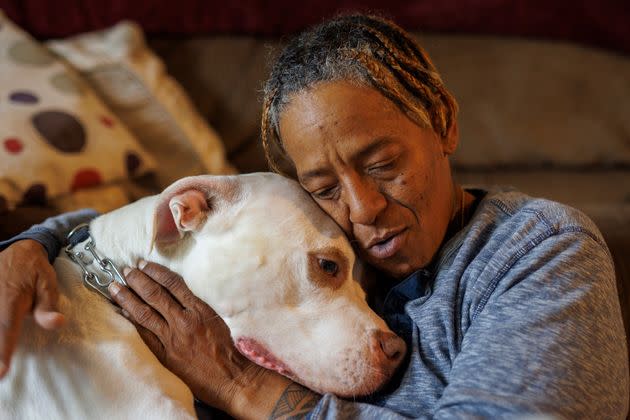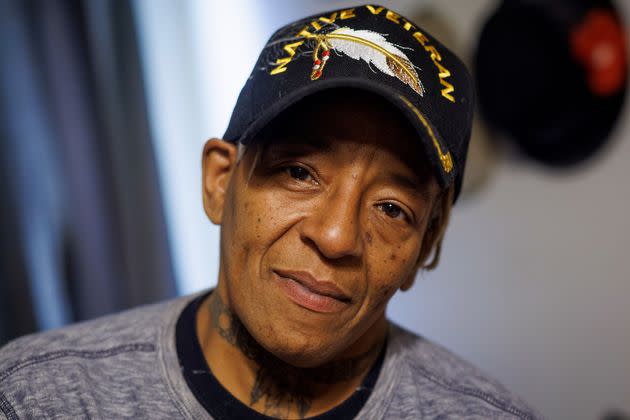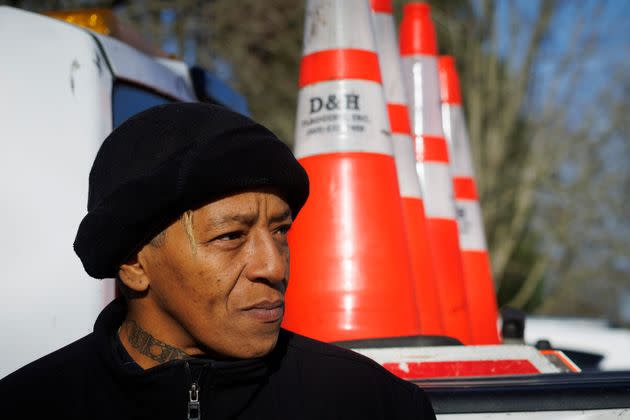Oregon Passed A Bill To Compensate The Wrongfully Convicted. Almost None Of Them Have Been Paid.
- Oops!Something went wrong.Please try again later.

Lisa Roberts spent 12 years in prison before she was exonerated.
Lisa Roberts had just a few minutes to explain to a group of state lawmakers on a video conference call all that she had lost from being convicted of a murder she did not commit.
It wasn’t just the 12 years in prison, although that was, of course, hell. She missed her only child’s high school graduation. She missed the birth of her first grandchild. And she missed the chance to spend time with mother before she died. She missed opportunities to build a career — even after her exoneration, the National Guard would not allow her to return to her job as a mechanic.
“I was released with nothing more than with the clothes on my back,” Roberts testified in a March 2021 legislative hearing. “The state wrongfully incarcerated me for 12 years, and I still struggle just to make ends meet.”
At the time, Oregon was one of just 15 states that did not have a law to compensate people who had been wrongfully convicted. Roberts helped change that. Although Oregon’s wrongful conviction compensation bill stalled in 2021, it passed the following year with unanimous support in both chambers of the legislature. When Senate Bill 1584 went into effect in March 2022, people who could prove by “a preponderance of evidence” that they did not commit or aid in the crime they were convicted of became eligible for $65,000 for each year spent in prison, and $25,000 for each year spent on parole or on the sex offender registry. The bill also allowed the state to give exonerees access to social services, including counseling, housing assistance and job training.
But more than a 1 1/2 years after the bill went into effect, state officials could only name two exonerees, who were wrongfully convicted of the same homicide, who had received compensation. Others who have sought payment, including Roberts, are facing fierce opposition from Oregon’s Department of Justice, which is forcing most petitioners into the lengthy and potentially traumatizing process of relitigating their innocence in court.
“That was not the intention,” state Sen. Kim Thatcher (R), the chief sponsor of the bill, said in an interview with HuffPost. “There was no intention to have to have a court battle.”
Thatcher was inspired to introduce the wrongful conviction compensation bill after a conversation with John Loveless, a handyman who installed appliances in her home. In 2000, Loveless was exonerated after being wrongfully convicted of child sex abuse. He was in his late 60s by the time he met Thatcher, but told the lawmaker that retirement was not an option. He had spent roughly a decade of his “earning years” locked up, unable to make a living wage.
Exonerations are often depicted in the media as joyful, redemptive experiences, but being declared innocent does not magically restore all that is lost to years of incarceration. “People just don’t understand the ongoing hell that these exonerees go through,” said Janis Puracal, the executive director of the Forensic Justice Project. “There is a stigma that attaches to a person once you’ve been in prison that never leaves you. And it does not matter whether you’ve been exonerated or not.”
Thatcher worked closely with policy experts to draft a bill that built on best practices in other states. They also incorporated feedback from Oregon’s Justice Department, which ultimately supported the final version of the bill. In order to receive compensation, exonerees are required to first file notice with the Department of Administrative Services and then file a petition in court, giving the Justice Department the opportunity to fight claims they think are illegitimate.
As of late October, 28 people have filed notice of intent to seek compensation, about a dozen of whom have filed petitions in court. (State officials said they were unable to provide updated numbers ahead of publication.)A review of court records show that Justice Department lawyers appear to be fighting compensation for nearly every case filed in court, including people who are on the National Registry of Exonerations — a vetted list of contemporary exonerations in the U.S. — and who testified in support of the bill.
In at least one case, DOJ lawyers tried, unsuccessfully, to block an individual seeking compensation from mentioning that he is on the National Registry of Exonerations in his petition, arguing that it is “frivolous and/or irrelevant to the issue of whether or not he actually committed the crime for which he was previously convicted of.”
“I am really surprised by DOJ’s response to these cases,” said Puracal, who worked closely with the Justice Department to reach a consensus on the bill. “It’s kind of a gut punch to turn around and see that no one is getting compensation, and that the bill has turned into another fight for these exonerees.”
According to the state’s Justice Department, the only people who have received payment through the bill are Christopher Boots and Eric Proctor, who were convicted in the 1983 killing of a store clerk after Boots discovered the body at a 7-Eleven and reported it to the police. They were exonerated after eight years in prison when the actual killer was surreptitiously recorded confessing to the crime.
After their release, Boots and Proctor settled a civil lawsuit against the city of Springfield and two police officers over allegations that police gave incorrect information on lab tests and intimidated witnesses into providing false testimony. Presented with conclusive evidence of their innocence and egregious police misconduct, the Oregon’s Justice Department agreed Boots and Proctor were entitled compensation under S.B. 1584 before they even filed their petition in court, according to the pair’s lawyer, Jesse Merrithew.
That Boots and Proctor are the only recipients of compensation is indicative of the agency’s extraordinarily narrow view of what counts as innocence. Until the passage of S.B. 1584, there was no mechanism in Oregon for people to definitively establish their innocence. There were, however, legal mechanisms that strongly indicated innocence, like receiving a pardon on the basis of innocence or a judge vacating a conviction after reviewing new evidence.
“These people have been fighting against wrongful convictions for years, even decades. And they won,” said Ben Haile, senior counsel at the Oregon Justice Resource Center. “The DOJ is setting the bar too high. The law is designed to compensate people who are truly innocent, but it’s not working that way,” continued Haile, who is one of the lawyers representing Roberts and another petitioner, Earl Bain.
At the advice of their lawyers, both Roberts and Bain declined to be interviewed for this story while litigation is ongoing.
Oregon Department of Justice spokesman Roy Kaufmann declined multiple requests for an interview to discuss the agency’s implementation of S.B. 1584, citing a policy against commenting on “pending matters.”

Lisa Roberts served in the Army and worked as a mechanic for the National Guard.
‘Legal Unicorns’
Roberts was arrested in 2002 and charged with killing her romantic partner, Jerri Williams. Roberts maintained her innocence throughout two years of pretrial incarceration. But when her trial lawyer claimed prosecutors could “pinpoint” her at the park where Williams’ body was found at the time of the crime, she agreed to plead guilty to manslaughter in exchange for a 15-year prison sentence, rather than risk a life sentence.
Roberts soon regretted her decision and began appealing her conviction. In 2008, she filed for federal habeas corpus relief, the process of contesting unconstitutional imprisonment. Prisoners are required to file for habeas relief within a year of conclusion of state remedies, and Roberts had missed that deadline. There is, however, a so-called “actual innocence gateway” around this time restriction: If a prisoner can present new evidence of innocence that shows “it is more likely than not” that “no juror, acting reasonably, would have voted to find [the prisoner] guilty beyond a reasonable doubt,” the judge can excuse the procedural issue and move on to consider the constitutional error raised in the habeas claim.
In 2014, U.S. District Judge Malcolm Marsh ruled Roberts had cleared the actual innocence gateway, citing DNA evidence that pointed to a different suspect with a history of violence against women, and evidence that undermined the prosecution’s theory of the crime. Marsh went on to consider Roberts’ habeas claims and granted relief on one, finding that she had received ineffective assistance of counsel at trial. He ordered her released from prison, unless the state retried her within 90 days, which it declined to do.
The “actual innocence gateway,” also called the Schlup standard after its Supreme Court precedent, is an extraordinarily high bar to meet. According to Roberts’ legal team, only 1.7% of Schlup claims in Oregon federal courts have been successful. But Oregon DOJ lawyers are now arguing that it’s not enough to warrant compensation.
As part of his review of her case, Marsh reviewed three habeas claims, including a so-called freestanding innocence claim. Unlike other habeas claims, free-standing innocence claims would not require prisoners to identify a constitutional error in their case. Instead, they argue they should be freed solely on the basis of their innocence. The Supreme Court has suggested that this could be possible in instances where the evidence “unquestionably” establishes innocence, but it has never identified a case that met this standard. Similarly, no circuit court has ruled in favor of a free-standing innocence claim, and some have even held that they cannot be raised in court.

Twelve years of wrongful incarceration left Lisa Roberts struggling to make ends meet after her release.
In a California case involving an exoneree seeking compensation, the court stated that findings of unquestionable existence “are legal unicorns, assumed for argument’s sake to be viable by some courts … but never seen as the ultimately successful predicate for the grant of habeas relief.”
Unsurprisingly, Marsh denied Roberts’ free-standing innocence claim. In other words, although he ruled that no reasonable juror would have found her guilty in light of newly presented evidence, he found she did not meet the almost impossible high standard of unquestionably proving she did not kill Williams. In a June court filing, DOJ lawyers claimed that legal technicality meant that the question of Roberts’ innocence had already been “heard, considered, and rejected.”
Steve Wax, the legal director of the Oregon Innocence Project and one of Roberts’ lawyers, said in an interview that he has handled and supervised more habeas corpus cases than anyone in Oregon. “The reality is, that regardless of the claim, you have to prove prejudice,” he said. “Given the reluctance of judges to risk releasing someone who has been convicted, this means they have to believe that there is a real injustice — that is, a reasonable likelihood that the person is innocent.”
In September, the judge overseeing Roberts’ compensation case rejected the state’s argument that the outcome of her free-standing innocence claim during habeas proceedings precluded her from receiving compensation under S.B. 1584. However, the judge also rejected Roberts’ argument that clearing the Schlup standard meant she had already proven her innocence. The trial is scheduled to begin early next year.
“If you look at the cases that are on file, these exonerees went to great lengths to prove that they were, in fact, innocent, so that they could be exonerated in the first place,” Puracal said. “And now the attorney general is pretending like none of that happened. They’re ignoring all of the evidence that came to light in post-conviction proceedings and forcing these people to do the same thing all over again.”
Part of the problem, according to Puracal, is the lack of an independent unit within Oregon’s Department of Justice to review compensation claims. “It’s just human nature. DOJ can’t, under one case, be arguing that the person is guilty and then, in another case, turn on their heels and agree that they’re innocent.”
‘You Go Through All That Just For A ‘Sorry’’

Earl Bain received a rare gubernatorial pardon on the basis of innocence.
Even a man pardoned by the governor on the explicit basis of innocence is facing opposition from the Justice Department. In 2009, Earl Bain was convicted by a non-unanimous jury of sexually abusing his daughter. He was sentenced to six years in prison, 10 years of post-prison supervision, and required to register as a sex offender. The only evidence was statements from his daughter, who was 7 years old at the time of the allegations, and the subject of a bitter custody battle between Bain and his ex-wife. Bain, who has always maintained his innocence, rejected a plea deal that would have spared him prison time if he admitted guilt and underwent treatment.
Years later, when Bain’s daughter was in her mid-teens, she recanted the allegations in a taped interview with Bain’s lawyers. By then, she was living with her paternal grandparents, had worked with a therapist, and was adamant that the abuse did not occur. Years earlier, she had begun asking questions about her father’s case, she said in the interview. She realized her own story about the alleged abuse always changed, and she believed “something’s wrong,” she said. After reading Bain’s case file and transcript, she told her grandmother, “My dad didn’t do this.” Asked why she accused Bain of abuse when she was younger, Bain’s daughter said she believed she was influenced by her mom.
Bain had completed his prison sentence by then, but he filed a federal habeas petition, seeking release from post-prison supervision and the sex offender registry. Like Roberts, Bain filed his petition outside the one-year limitation period, but argued that Marsh, the same judge, should consider his claims because of the evidence of his innocence. But the judge found that Bain did not meet the high standard required under the Schlup, the actual innocence gateway.
“[T]his court does not question the sincerity of [Bain’s daughter’s] recantation,” Marsh wrote in his 2018 opinion denying habeas relief. “However, the totality of the evidence only renders it possible that a reasonable juror would not have convicted” Bain.
Bain appealed the denial to the 9th Circuit Court of Appeals, which affirmed Marsh’s decision. A dissenting judge, however, argued that Marsh should not have made his decision before holding an evidentiary hearing to assess the credibility of Bain’s daughter.
By 2020, Bain had completed his post-prison supervision sentence and was working on rebuilding his relationship with his daughter. But still, he wanted to clear his name. With support from the Oregon Innocence Project, Bain applied to then-Gov. Kate Brown (D) for a pardon. Later that year, Brown granted Bain her first and only pardon on the basis of innocence.
“I concluded that Mr. Bain was truly innocent and should be pardoned,” Brown wrote in a report to lawmakers, noting that Bain’s alleged victim had “completely and legitimately recanted her allegation.”
Malheur County District Attorney Dave Goldthorpe, who met with Bain’s daughter, supported Bain’s pardon.
Along with Roberts, Bain became a key face of the wrongful conviction compensation bill. He testified in legislative hearings in both 2021 and 2022 and wrote an op-ed about the need to compensate exonerees. He described the pain of losing custody of his two daughters and being forbidden from communicating with them during his incarceration. Even after his release, he spent thousands of dollars on polygraphs mandated by his parole officer and endured the stigma of being a registered sex offender. A combat Army veteran, Bain had hoped to make a career in the military, but after all this, he said, “My body’s too tore up.”

Before he was pardoned on the basis of innocence, Bain spent thousands of dollars on polygraphs mandated by his parole officer.
“I’m appreciative of the exoneration, but basically, it was kind of like, ‘We’re sorry that that happened to you.’ And that was kind of it,” Bain testified in 2021. “You lose all those years and you go through all that for just a ‘sorry.’ It’s kind of like, almost what’s the point?”
Bain was one of the first exonerees to seek compensation after S.B. 1584 went into effect. But the Oregon Department of Justice fought his case too. In a July court filing, the state DOJ argued that the governor’s pardon does not prove that he did not commit the crime he was convicted of. The trial for Bain’s compensation case is scheduled to begin in mid-2024.
“I don’t understand the position that the attorney general’s office is taking in these cases. They supported the compensation bill and are now opposing nearly all claims,” said Wax, who also represents Bain.
The attorney general’s office “presents itself as a strong supporter of women’s rights and the rights of crime victims,” Wax continued. “When [Bain’s daughter] presented as a victim under the influence of her mother in an horrific custody dispute, she was treated with the utmost respect. When she came back years later and said she was not abused, she has been given no respect. Instead, both she and Lisa are being put through the ringer and retraumatized.”
None of this is what state lawmakers had in mind when they passed S.B. 1584. They envisioned the state Justice Department intervening against baseless innocence claims or people whose convictions were overturned based on a technicality, rather than evidence of innocence. But they didn’t expect the DOJ to oppose almost every compensation petition.
“Oh, my word. You gotta be kidding me,” Thatcher, the state senator who introduced S.B. 1584, said when told Bain had yet to receive compensation. “I had not heard that. I thought for sure he’d be first in line and the first one to get it.”
“What a nightmare,” Thatcher added. “This was not the intention. Not at all.”
The resulting legal battle would take a toll on anyone, Haile said, but is especially difficult for people who were wrongfully convicted. “Each time they go to court to fight for compensation, [it] brings back the trauma of their horrible experiences in court, of being in prison, and of being scorned and disbelieved each time they asserted their innocence,” he continued.
The policy experts who worked to pass S.B. 1584 say the Justice Department’s enforcement approach defeats the purpose of the bill. Before the bill passed, exonerees had the option to seek monetary damages through civil litigation. But many chose not to because “going through a civil suit is incredibly, incredibly difficult,” Puracal said. “Not only is it time consuming and expensive, but most of them fail because there are things like immunity for prosecutors and immunity for police.”
“The goal of a wrongful conviction compensation statute,” Puaracal continued, “is to avoid all of that and focus on the fact that we’ve got an innocent person with years taken away from them.”
